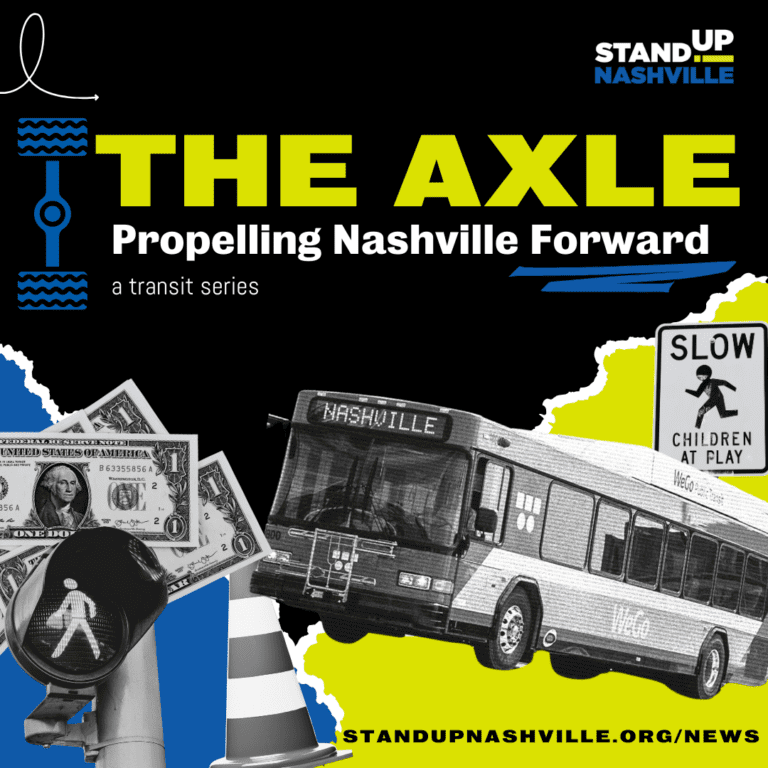ICYMI: The Tennessean coverage of the STAND UP Nashville Launch
UNIONS, OTHERS CALL FOR EQUITY FROM NASHVILLE’S BOOM
Joey Garrison , jgarrison@tennessean.com10:02 p.m. CDT October 25, 2016
Construction cranes dominate Nashville’s skyline, developers have discovered riches in previously ignored neighborhoods, and the city tops all sorts of lists that rank the nation’s hottest places to live.
But a group of Nashville unions and other like-minded organizations say too many Nashvillians aren’t benefiting from the economic boom. They’ve now formed a new coalition called Stand Up Nashville that they say will seek to expand the economy’s reach.
The effort marks the partnership of nine organizations, including the Central Labor Council of Nashville and Middle Tennessee; the AFL-CIO; Nashville Organized for Action and Hope (NOAH); and the Tennessee Immigrant and Refugee Rights Coalition, or TIRRC.
They plan to advocate at the local level for “more equitable development.”
In the short term, their focus is on Metro’s use of financial incentives for economic development. They argue city incentives for private business can be leveraged to create better-paying jobs on affected projects — in construction and hospitality, for example — and also help fund the creation of affordable housing for Nashvillians. They also say opportunities exist for workforce programs and apprenticeship programs to be a part of projects that receive the city’s help.
“We’re starting at a place where you can have the most influence,” said Jason Freeman, campaigns and community coordinator for the Central Labor Council of Nashville and Middle Tennessee. “The city has the most control over its public assets. By setting a good example, leading by example, we hope that the private developers would come along with that.
“We also have full intention of engaging with private developers to have the communities that they’re working in communicate what they want from development and how they could better serve the community.”
Other groups that form the Stand Up Nashville coalition are Democracy Nashville, Ironworkers International Union, LiUNA Southeast Laborers District Council, Workers’ Dignity and the Service Employees International Union Local 205, which represents Metro government employees.
Davidson County’s unemployment rate of 3.8 percent is second lowest in Tennessee, but the poverty rate is still at 16.9 percent, according to the U.S. Census Bureau. This actually marks an improvement from a previous poverty rate of 19.9 percent.
A recent analysis from the Nashville Business Journal found that wealth has expanded in Nashville’s wealthiest ZIP codes over the past three years at the same time poverty has increased in its poorest areas.
The coalition intends to fight for what are known as community benefits agreements with private developers. Used in other cities, the idea is to create a contract between investors of projects and neighborhoods to address concerns of the latter.
As an example, Stand Up Nashville’s leaders point to Denver, where the city in recent years oversaw an agreement involving a mixed-use project at the site of an abandoned rubber plant that resulted in affordable housing and living wages for construction jobs.
“Essentially, we think there needs to be a better way of doing business in Nashville,” said Stephanie Teatro, co-executive director of TIRRC, which advocates for immigrants and refugees in Nashville. “For the last several years, we’ve had this boom. The city has grown tremendously, but we’ve seen very little growth and benefit for working families in Nashville.
“We think first the city has a role to play in ensuring that all communities benefit,” she said. “What we’ve seen instead is the city not necessarily really leveraging its resources, leveraging the city’s assets to ensure that the kind of development in the city is equitable and shared.”
In a statement, Mayor Megan Barry’s spokesman, Sean Braisted, said, “We look forward to learning more about this organization and finding ways to partner with them to augment Mayor Barry’s efforts to promote economic equity and inclusion in all of Nashville.”
Barry benefited from support of Nashville’s unions and other left-leaning political organizations in her victory last year in the city’s mayoral runoff.
During her first year in office, Barry expanded the mayor’s Office of Economic Opportunity and Empowerment to include aides to oversee affordable housing as well as labor and workforce issues.
Barry also was a supporter of a union-led push for passage last year of a new Metro Charter amendment to require that at least 40 percent of large Metro construction projects include workers who live in Davidson County. Although the Republican-controlled state legislature overturned that measure, Barry last year outlined new procurement policies that prioritize local workers.
Her predecessor Mayor Karl Dean had a sometimes rocky relationship with organized labor, which routinely criticized Metro’s handling of the workforce of the construction of the $623 million Music City Center — the most expensive municipal-financed project in Tennessee history. They said too many workers weren’t from Davidson County and included temporary workers who were paid low wages.
On the economic development front, Dean frequently turned to financial incentives, including property tax discounts, to lure corporations to Nashville or keep them in town. His administration’s two largest deals were for Nashville-based companies, HCA and Bridgestone Americas, to relocate downtown.
Although Barry has said she also supports the use of financial incentives, she oversaw fewer incentive deals during her first year in office than Dean did during his final year in office.
The labor council’s Freeman, who is serving as chairman of Stand Up Nashville, said he believes there’s a “tremendous amount of opportunity for collaboration with the council and with the mayor” to make inroads on the coalition’s goals.
Another objective of Stand Up Nashville is advocating for greater transparency of Metro boards and commissions, which it says make major decisions regarding city contracts and incentives without the knowledge of most Nashvillians.
The coalition plans to hold public forums to gather feedback to help guide its effort.
“As we organize and engage more people in every community, I think their voices are going to be very loud and developers are going to want to work with them,” Freeman said.
http://www.tennessean.com/story/news/2016/10/25/unions-others-call-equity-nashvilles-boom/92717912/







